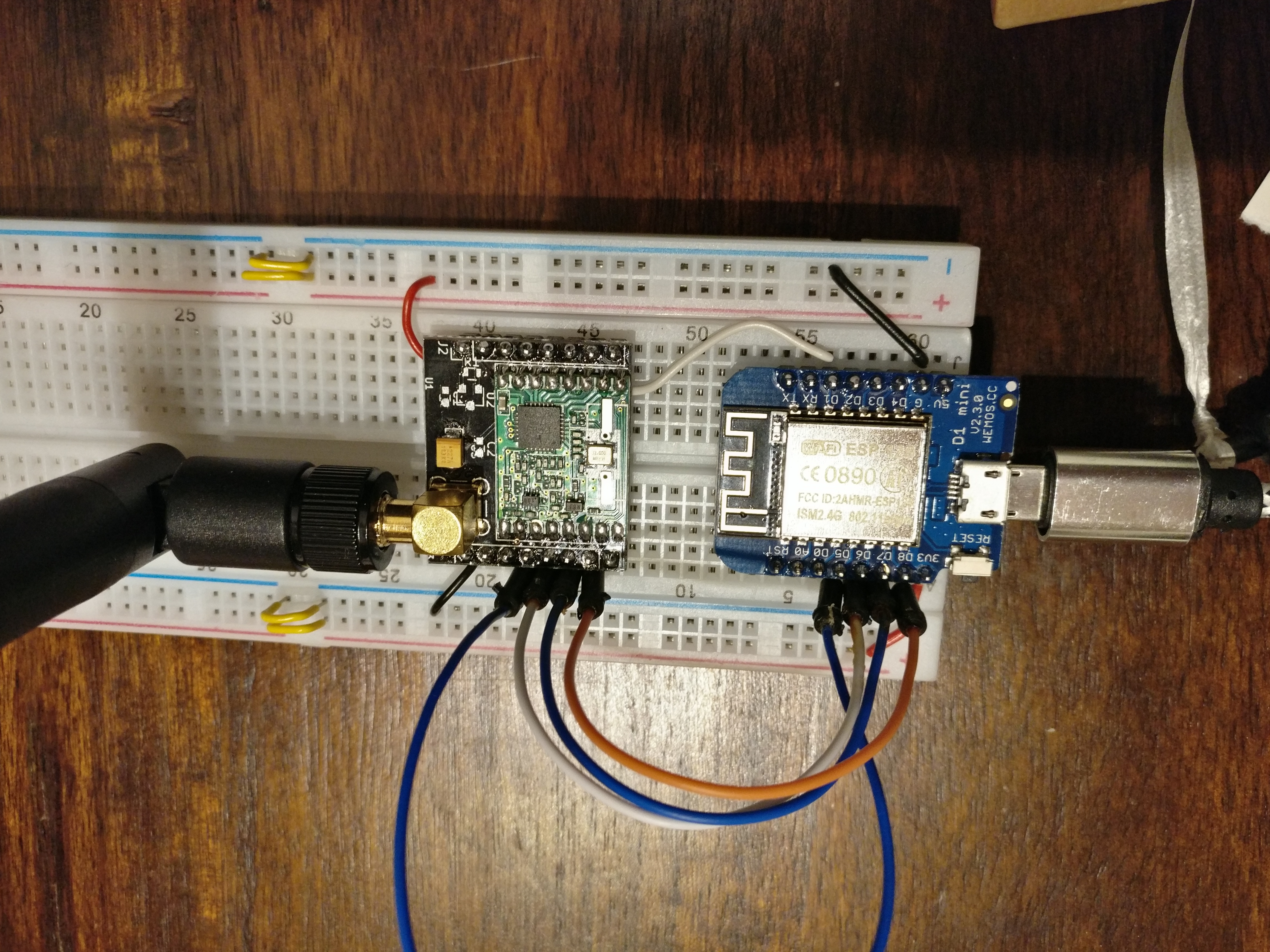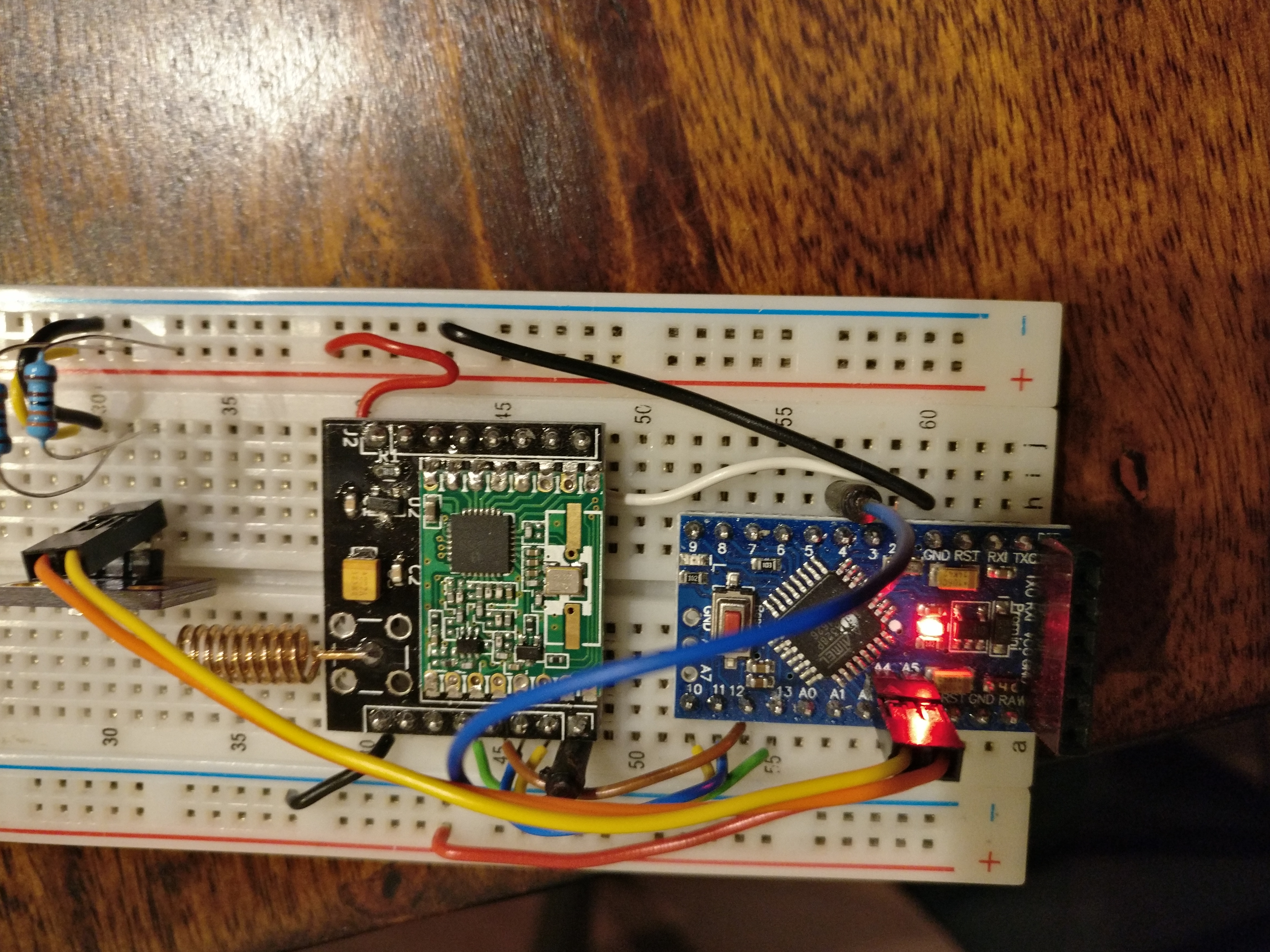Cannot get RFM69HW connection between ESP8266GW and Pro Mini Sensor
-
Do you mean this with output power?:
@elcaron said in Cannot get RFM69 connection between ESP8266GW and Pro Mini Sensor:
#define MY_RFM69_MAX_POWER_LEVEL_DBM (10u)
I use exactly the same includes in both sketches, hence the precompiler if statement. Apart from that, there are of course the very different antennas, but with Radiohead, this test setup has a range and wall penetration that can at least rival my 2.4GHz Wifi (works through a concrete ceiling + wall). I have also moved the sensor a few meters away from the gateway now, no difference.
you have disabled encryption on both the node and the GW? If one of them has it enabled and the other not, they can't communicate.
As I said, I use exactly the same precompiler defines shown above in both sketches. I have tried it with both encryption activated and deactivated. I tested how encryption behaves using the Radiohead lib and understand that it has to match.
BTW, I am the guy from two weeks ago who had problems with the ATSHA, but I decided to first get the basic stuff sorted :)Guess I have to dig out another Pro Mini to test if at least that communication works.
-
Do you mean this with output power?:
@elcaron said in Cannot get RFM69 connection between ESP8266GW and Pro Mini Sensor:
#define MY_RFM69_MAX_POWER_LEVEL_DBM (10u)
I use exactly the same includes in both sketches, hence the precompiler if statement. Apart from that, there are of course the very different antennas, but with Radiohead, this test setup has a range and wall penetration that can at least rival my 2.4GHz Wifi (works through a concrete ceiling + wall). I have also moved the sensor a few meters away from the gateway now, no difference.
you have disabled encryption on both the node and the GW? If one of them has it enabled and the other not, they can't communicate.
As I said, I use exactly the same precompiler defines shown above in both sketches. I have tried it with both encryption activated and deactivated. I tested how encryption behaves using the Radiohead lib and understand that it has to match.
BTW, I am the guy from two weeks ago who had problems with the ATSHA, but I decided to first get the basic stuff sorted :)Guess I have to dig out another Pro Mini to test if at least that communication works.
@elcaron ah, thought it sounded familiar :)
Then I think we can rule out the security complications.Have you tested to move the nodes further apart? I have noticed that if they are too close, or within a certain range in close proximity, rf signal decreases significantly.
-
In the last test , they where 5m apart. With radiohead, they work both 20cm away and 20m away with one concrete wall and one ceiling.
Seems like I have to decide soon if it is easier to dust off the logic analyser and find out what is going on, or to implement HMAC with Radiohead :) -
Do you mean this with output power?:
@elcaron said in Cannot get RFM69 connection between ESP8266GW and Pro Mini Sensor:
#define MY_RFM69_MAX_POWER_LEVEL_DBM (10u)
I use exactly the same includes in both sketches, hence the precompiler if statement. Apart from that, there are of course the very different antennas, but with Radiohead, this test setup has a range and wall penetration that can at least rival my 2.4GHz Wifi (works through a concrete ceiling + wall). I have also moved the sensor a few meters away from the gateway now, no difference.
you have disabled encryption on both the node and the GW? If one of them has it enabled and the other not, they can't communicate.
As I said, I use exactly the same precompiler defines shown above in both sketches. I have tried it with both encryption activated and deactivated. I tested how encryption behaves using the Radiohead lib and understand that it has to match.
BTW, I am the guy from two weeks ago who had problems with the ATSHA, but I decided to first get the basic stuff sorted :)Guess I have to dig out another Pro Mini to test if at least that communication works.
@elcaron sorry for being unclear. I was asking if you used 10dBm output power when testing with the radiohead client/server.
If you are using less power with radiohead, that could be the answer. As I said, too much power often causes problems.
-
-
As far as I understand the documentation, I still have ATC enabled, as I did not set
#define MY_RFM69_ATC_MODE_DISABLEDWith
MY_RFM69_MAX_POWER_LEVEL_DBM, i could go up to 14dBm for my local legislation, but I stayed a little below it, because I wasn't sure about the antenna gain on the gateway. Do you actually think 10mW compared to the legally possible 25mW are the problem, given that I test at 50cm and 5m line of sight? -
Ok, I have quoted that line for completeness. No change. I have also set
MY_SIGNING_SIMPLE_PASSWDon both nodes to try to rule out issues with encryption:These are my radio related precompiler statements right now:
#define MY_RADIO_RFM69 #define MY_RFM69_FREQUENCY (RFM69_868MHZ) #if defined ARDUINO_ARCH_ESP8266 #define MY_RFM69_IRQ_PIN D1 #define MY_RFM69_CS_PIN D8 #elif defined ARDUINO_ARCH_AVR #define MY_RFM69_IRQ_PIN 2 #define MY_RFM69_CS_PIN 10 #endif #define MY_IS_RFM69HW #define MY_RFM69_NETWORKID (83) #define MY_SIGNING_SIMPLE_PASSWD "MyInsecurePassword" //#define MY_RFM69_MAX_POWER_LEVEL_DBM (10u) //#define MY_RFM69_ENABLE_ENCRYPTION //#define MY_RFM69_SPI_SPEED (800000ul) -
Ok, I have quoted that line for completeness. No change. I have also set
MY_SIGNING_SIMPLE_PASSWDon both nodes to try to rule out issues with encryption:These are my radio related precompiler statements right now:
#define MY_RADIO_RFM69 #define MY_RFM69_FREQUENCY (RFM69_868MHZ) #if defined ARDUINO_ARCH_ESP8266 #define MY_RFM69_IRQ_PIN D1 #define MY_RFM69_CS_PIN D8 #elif defined ARDUINO_ARCH_AVR #define MY_RFM69_IRQ_PIN 2 #define MY_RFM69_CS_PIN 10 #endif #define MY_IS_RFM69HW #define MY_RFM69_NETWORKID (83) #define MY_SIGNING_SIMPLE_PASSWD "MyInsecurePassword" //#define MY_RFM69_MAX_POWER_LEVEL_DBM (10u) //#define MY_RFM69_ENABLE_ENCRYPTION //#define MY_RFM69_SPI_SPEED (800000ul) -
@elcaron looked like you had encryption disabled previously, so I don't think any security feature is the cause of these issues. Unless you had it defined mysensors.h by accident.
@anticimex Didn't expect that either, but better safe than sorry.
-
@anticimex Didn't expect that either, but better safe than sorry.
-
For further testing, I have set up two Pro Mini now. With these, I get some communication.
SerialGateway:
0;255;3;0;9;0 MCO:BGN:INIT GW,CP=RRNGA---,VER=2.2.0 0;255;3;0;9;4 TSM:INIT 0;255;3;0;9;6 TSF:WUR:MS=0 0;255;3;0;9;10 TSM:INIT:TSP OK 0;255;3;0;9;14 TSM:INIT:GW MODE 0;255;3;0;9;16 TSM:READY:ID=0,PAR=0,DIS=0 0;255;3;0;9;22 MCO:REG:NOT NEEDED 0;255;3;0;14;Gateway startup complete. 0;255;0;0;18;2.2.0 0;255;3;0;9;28 MCO:BGN:STP 0;255;3;0;9;34 MCO:BGN:INIT OK,TSP=1 0;255;3;0;9;3753 TSF:MSG:READ,255-255-255,s=255,c=3,t=7,pt=0,l=0,sg=0: 0;255;3;0;9;3760 TSF:MSG:BC 0;255;3;0;9;3764 TSF:MSG:FPAR REQ,ID=255 0;255;3;0;9;3768 TSF:CKU:OK,FCTRL 0;255;3;0;9;3770 TSF:MSG:GWL OK 0;255;3;0;9;5695 TSF:MSG:SEND,0-0-255-255,s=255,c=3,t=8,pt=1,l=1,sg=0,ft=0,st=OK:0 0;255;3;0;9;6993 TSF:MSG:READ,255-255-0,s=192,c=3,t=3,pt=0,l=0,sg=0: 255;192;3;0;3; 0;255;3;0;9;9218 TSF:MSG:READ,255-255-0,s=161,c=3,t=3,pt=0,l=0,sg=0: 255;161;3;0;3; 0;255;3;0;9;11239 TSF:MSG:READ,255-255-0,s=79,c=3,t=3,pt=0,l=0,sg=0: 255;79;3;0;3; 0;255;3;0;9;13258 TSF:MSG:READ,255-255-0,s=49,c=3,t=3,pt=0,l=0,sg=0: 255;49;3;0;3;Client:
16 MCO:BGN:INIT NODE,CP=RRNNA---,VER=2.2.0 26 TSM:INIT 28 TSF:WUR:MS=0 30 TSM:INIT:TSP OK 32 TSM:FPAR 1253 TSF:MSG:SEND,255-255-255-255,s=255,c=3,t=7,pt=0,l=0,sg=0,ft=0,st=OK: 1374 TSF:MSG:READ,0-0-255,s=255,c=3,t=8,pt=1,l=1,sg=0:0 1380 TSF:MSG:FPAR OK,ID=0,D=1 1576 TSF:MSG:READ,0-0-255,s=255,c=3,t=8,pt=1,l=1,sg=0:0 1779 TSF:MSG:READ,0-0-255,s=255,c=3,t=8,pt=1,l=1,sg=0:0 3262 TSM:FPAR:OK 3262 TSM:ID 3264 TSM:ID:REQ 3274 TSF:MSG:SEND,255-255-0-0,s=192,c=3,t=3,pt=0,l=0,sg=0,ft=0,st=OK: 5281 TSM:ID 5281 TSM:ID:REQ 5494 TSF:MSG:SEND,255-255-0-0,s=161,c=3,t=3,pt=0,l=0,sg=0,ft=0,st=OK: 7503 TSM:ID 7503 TSM:ID:REQ 7514 TSF:MSG:SEND,255-255-0-0,s=79,c=3,t=3,pt=0,l=0,sg=0,ft=0,st=OK: 9521 TSM:ID 9521 TSM:ID:REQ 9531 TSF:MSG:SEND,255-255-0-0,s=49,c=3,t=3,pt=0,l=0,sg=0,ft=0,st=OK: 11538 !TSM:ID:FAIL 11540 TSM:FAIL:CNT=1 11542 TSM:FAIL:DIS 11544 TSF:TDI:TSLIt looks like they exchange packages about the parent, but the gateway never answers the id request for some reason.
I have quoted all lines regarding inclusion mode in the gateway sketch.
Is this because no controller is configured?Interestingly, falshed as a node, the ESP8266 now also shows up on the gateway, with the same issues.
-
Exactly. If no controller is configured, nobody assigns a node id, so you need to define it yourself.
-
I asked you earlier if you set a NODE ID, if not you have to add
#define MY_NODE_ID 1
before the include mysensors.h in your node sketch
-
Ok, I have finally identified the issue.
I did some more testing with the switched roles, ESP8266 as (light) sensor, Pro Mini as serial gateway, hardcoded MY_NODE_ID. According to the logs, the ESP sends the parent quest, the Pro Mini answers, but never gets an ACK. The ESP does not report any answer. Ergo, the interrupt doesn't work.
So I scoped it, electrically, everything was fine. I tried D2 instead of D1, no change. Then I remembered that the default in the code was GPIO2, which is D4. This is a really stupid choice, because if you connect it like that, the ESP will not boot. GPIO2 needs to be pulled up during boot, and DIO0 from the RFM69 pulls it down. What works though is to first boot, then connect the cable.
Lo and behold - everything suddenly worked. So either I am the idiot and#define MY_RFM69_IRQ_PIN D1is not how you set the interrupt, or whoever thought that it was clever to default the interrupt to a pin that prevents booting also decided to ignore the configured value ...I'll dig into the code to find out, but of course wouldn't mind if anybody who knows the code better would be faster :)
Will file an issue or pull request if I find something. -
Quick update: Setting
#define MY_RFM69_IRQ_NUM 5(D1=GPIO5, the ESP has interrupts on (almost) all GPIO pins and the interrupt number equals the pin number) - that is, skipping the digitalPinToInterrupt() function - seems to work. That should pretty much localize the problem. -
Ok, I have finally identified the issue.
I did some more testing with the switched roles, ESP8266 as (light) sensor, Pro Mini as serial gateway, hardcoded MY_NODE_ID. According to the logs, the ESP sends the parent quest, the Pro Mini answers, but never gets an ACK. The ESP does not report any answer. Ergo, the interrupt doesn't work.
So I scoped it, electrically, everything was fine. I tried D2 instead of D1, no change. Then I remembered that the default in the code was GPIO2, which is D4. This is a really stupid choice, because if you connect it like that, the ESP will not boot. GPIO2 needs to be pulled up during boot, and DIO0 from the RFM69 pulls it down. What works though is to first boot, then connect the cable.
Lo and behold - everything suddenly worked. So either I am the idiot and#define MY_RFM69_IRQ_PIN D1is not how you set the interrupt, or whoever thought that it was clever to default the interrupt to a pin that prevents booting also decided to ignore the configured value ...I'll dig into the code to find out, but of course wouldn't mind if anybody who knows the code better would be faster :)
Will file an issue or pull request if I find something. -
@elcaron said in Cannot get RFM69HW connection between ESP8266GW and Pro Mini Sensor:
MY_RFM69_IRQ_PIN
So both MUST be defined? I thought NUM was prety much an override, since it can be programmatically derived from the pin. Undfortunaely, it does not seem to be documented.


